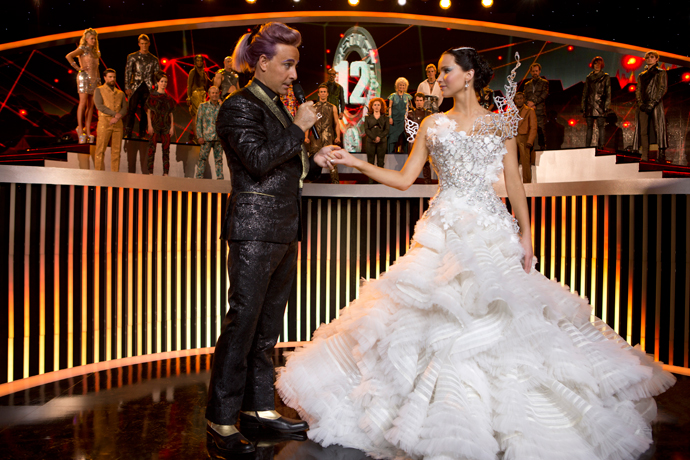Girls on Film: The Hunger Games may be turning you into an idiot villain
The massive success of the franchise has made its core lessons about media and celebrity all the more valuable. Some of us aren't paying attention.


A free daily email with the biggest news stories of the day – and the best features from TheWeek.com
You are now subscribed
Your newsletter sign-up was successful
The Hunger Games: Catching Fire arrives in theaters today, and based on advanced ticket sales alone, Lionsgate has another massive hit on its hands. But the mega-success of the blockbuster franchise has a strange kind of mirror effect on its story: What does The Hunger Games' breakout success say about the message of The Hunger Games?
With the arrival of the first Hunger Games movie in 2012, Katniss Everdeen (Jennifer Lawrence) quickly became a feminist hero. She was seen as the antidote to Twilight's Bella Swan — strong, untainted by the barriers of gender stereotypes, uninterested in romance, and determined to use her physical prowess to keep her family safe. It was a problematic differentiation — but one that allowed for a wildly popular heroine with a far more active role in her own story. The Hunger Games went beyond the boundaries of the trilogy's loyal fans, breaking records and making over half a billion dollars at the box office.
But, as always, great success can lead to great problems.
The Week
Escape your echo chamber. Get the facts behind the news, plus analysis from multiple perspectives.

Sign up for The Week's Free Newsletters
From our morning news briefing to a weekly Good News Newsletter, get the best of The Week delivered directly to your inbox.
From our morning news briefing to a weekly Good News Newsletter, get the best of The Week delivered directly to your inbox.
The success of The Hunger Games meant that Lawrence said goodbye to her old life — which allowed her to disappear into roles in films like Winter's Bone — and embraced life in the spotlight. Thus far, celebrity has been ridiculously kind to Lawrence. Far and wide, people tweet wishes to be her BFF, or pit her against actresses who have fallen out of favor. Her every stumble or statement is fawned over. But the adoration hints at the backlash that will inevitably come when her very human actions fail to live up to the superhuman expectations thrust upon her.
Katniss, the character she plays, has earned similar accolades as a strong feminist hero. She is a rarity, "a complex female character with courage, brains, and a quest of her own." She "learns to maintain that strength while opening herself up to the power of mutual support and sisterhood." She is "one of the better" role models, "clearly a Champion of the People." Far and wide, writers and fans have praised Katniss' strength, morality, and agency. The character has become an inspiration, and a face of modern cinematic feminism.
Meanwhile, the film series marches on as any box-office success would: Into a world of toys and tie-ins. On top of the expected — the toys, tees, and other associated goodies — The Hunger Games has inspired "Train Like a Tribute" workout events, "Capitol Beauty" cosmetics, chocolate bars filled with resources from each starving district, and Subway subs that you can eat to be as "bold" as the characters killing each other to survive.
The blurring of the lines between our world and Panem has another strange effect: The divide between our world and the dark, post-apocalyptic scenario of Collins' trilogy is shrinking.
A free daily email with the biggest news stories of the day – and the best features from TheWeek.com
The Hunger Games is primarily about the dangers of media, and the toll that both war and celebrity have on the psyche. In the wake of an old war against the one-percenters at the Capitol, the government of Panem enacted its revenge: A yearly battle called The Hunger Games, in which a girl and boy from each district, between the ages of 12 and 18, must fight to the death.
The event keeps the less fortunate in line while the clueless inhabitants of the Capitol feast on its entertainment value. The Games are their favorite reality television, an opportunity to pick favorites, bet on winners, and let the television manipulate their perception through a series of hardships, dramas, and deaths. The gravity of the scenario — that real, live kids are killing each other for the audience's amusement — is ignored, deemed irrelevant when compared to the rush of the adrenaline-filled entertainment they provide.
After the hope that ends the first film — that Katniss is returning a victor, relatively safe and able to provide for her family — Catching Fire begins with her in the throes of PTSD. She is unable to entertain emotions like love, swearing that there's room for nothing but the fear that consumes her. She is haunted by flashbacks of the people she killed and the horrors she faced, and feels alienated from those she cares about.
Her unintentional rise as the symbol of revolution inspires President Snow to do everything in his power to destroy her. He removes her few freedoms, kills or tortures those she inspires, and then sends her back to the ring, eager to remove her magnetic power and watch her die. Again and again, we see Lawrence's Katniss fall into a panic, screaming, struggling, and falling to her knees in emotional pain as she is manipulated and emotionally tortured.
And where Snow leaves off, the rest of the populace picks up. Katniss' heroic nature is masked by her position as the reluctant symbol of a revolution. Anyone and everyone uses her as a rallying call for their own interests (a theme that continues through the end of the series). Every time Katniss steps close to freedom, she also steps into more manipulation. She is always, and irrevocably, in a power structure that dictates her life — one that immediately questions her position as today's iconic feminist heroine.
When she's sent into the arena with fellow victors for the Quarter Quell — a "special" Games every 25 years that add additional dangers — we get a glimpse into Katniss' future. Most of the victors aren't secure, happy people living off the wealth of their position; they're severely damaged individuals. Haymitch's alcoholism isn't a quirk. It's one of the usual methods victors use to deal with the emotional toll that being a killer (and subsequently a trainer of killers) puts on a person. Each fellow victor suffers the emotional toll of the Games they won. Some mask it well, revealing only a glimmer of unrest in their anger over having to fight again, while others struggle more outwardly with addictions and insanity.

Katniss is, as I wrote during the release of the first film, "a puppet of greater political systems" — "a hero who can never really be a hero, from a text that explicitly tells us that heroism and public perception are the media's game."
Those qualities are eerily echoed in The Hunger Games' rise in the real world. As audiences put Katniss on a heroic pedestal — and consequently get inundated with simplistic, problematic marketing spins — we become the Capitol's citizens, ignoring the darkness and focusing on our own interests. Catching Fire forces us to see the error in our ways. We can wear Capitol makeup and eat Subway sandwiches, wrapped up in the bombast of the event, or follow author Suzanne Collins' own wish: "I hope it does make people think about what they watch, in a more reflective way."
Like young actors who become media sensations, Katniss is sent on a media tour early in the film, tasked with boasting the wonders of the Games and the Capitol over and over, forced to struggle through her weariness with a smile while appearing gracious. Her life is now the Capitol's; her personal life the fodder for public interest, her choices dissolving under the public pressure for her to be in love with (and get married to) Peeta.
At the onset of Catching Fire, Katniss has already lost a life of her own. She must live where the Capitol puts her and marry for the pleasure of her audience. Her body is manipulated to appeal to the Capitol audience, even as President Snow and his new gamemaker plot to destroy it in the Quarter Quell. Even in the Games, Katniss cannot manage to take control. There are alliances, pacts, and plans that render her decisions irrelevant. No matter how much strength and charisma she possesses, she's still a naïve kid who doesn't understand much of the world and human motivation — even if the public expects her to.
It's here that the movie screen becomes a mirror into our own bad habits. Think of the folly of using a celebrity's life for our pleasure, the unreasonable demands for information about celebrities' private lives, the body dysmorphia that shackles Hollywood, and the children who get swept up and damaged by the industry. Catching Fire's manipulated, scrutinized, emotionally scarred characters reflect the real young stars who struggle with their early fame or died trying. (In fact, Catching Fire arrives just one week after the tenth anniversary of one such star's death — actor Jonathan Brandis, who committed suicide in 2003.)
As soon as it's released to the public, art falls into the hands and mind of the viewer. But it would be a shame if Collins' genuinely thought-provoking world was overshadowed by the fandom, hero worship, and merchandising that comes with any blockbuster action franchise. Catching Fire is a stunning, quickly paced film that manages to do it all with one of Hollywood's best young talents. It boils a complex narrative into a cohesive adventure, and gives us the entertainment and adrenaline to puts people into theater seats. But let's not overlook what it does best of all: Deliver a powerful and ever-relevant message to chew on long after the movie is over — one that's not about a cinematic heroine, but about ourselves.
Girls on Film is a weekly column focusing on women and cinema. It can be found at TheWeek.com every Friday morning. And be sure to follow the Girls on Film Twitter feed for additional femme-con.
Monika Bartyzel is a freelance writer and creator of Girls on Film, a weekly look at femme-centric film news and concerns, now appearing at TheWeek.com. Her work has been published on sites including The Atlantic, Movies.com, Moviefone, Collider, and the now-defunct Cinematical, where she was a lead writer and assignment editor.
-
 The environmental cost of GLP-1s
The environmental cost of GLP-1sThe explainer Producing the drugs is a dirty process
-
 Greenland’s capital becomes ground zero for the country’s diplomatic straits
Greenland’s capital becomes ground zero for the country’s diplomatic straitsIN THE SPOTLIGHT A flurry of new consular activity in Nuuk shows how important Greenland has become to Europeans’ anxiety about American imperialism
-
 ‘This is something that happens all too often’
‘This is something that happens all too often’Instant Opinion Opinion, comment and editorials of the day
